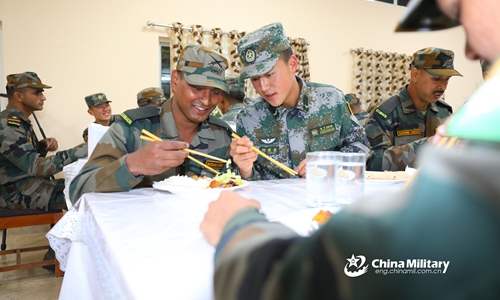'Soft landing' expected for China-India border clash: analysts
By Liu Xuanzun Source:Global Times Published: 2020/6/17 18:23:22

A Chinese soldier teaches his Indian peers how to pick up food with chopsticks during the dinner on December 11, 2019. The 8th China-India "Hand-in-Hand 2019" Joint Counter-terrorism Exercise kicked off at Umroi Cantonment in India on Dec. 7, 2019. Each military has dispatched 130 service members to take part in the 16-day exercise and the Chinese participating troops are from the PLA Xizang Military Command. (eng.chinamil.com.cn/Photo by Wang Hao)
The latest border conflicts between China and India will likely see a "soft landing" just like many previous ones, despite the deadly clash on Monday, as both countries have kept a clear and careful mind to keep all frictions in check, which was highlighted by both sides' restrained statements and the fact that both countries' troops did not use guns, analysts said.
China and India are in close communication on resolving the relevant issues through both diplomatic and military channels, Chinese Foreign Ministry spokesperson Zhao Lijian said at a routine press conference on Wednesday.
Troops from both countries have disengaged, Reuters reported on Wednesday, citing a statement by the Indian army.
The statements from both sides indicate that both countries have no intention of escalating the situation, analysts said.
Chinese and Indian border defense troops have a tacit understanding of not carrying lethal weapons and bullets, which is a precautionary measure aimed at preventing the escalation of any conflict, a source familiar with the matter told the Global Times under the condition of anonymity.
This tradition showed that China and India have always kept a clear and careful mind that even if a clash occurs, it should remain small-scale and controllable rather than an intensive one with gunfire that is bound to lead to more deaths, analysts said.
Tian Shichen, vice president of think tank Grandview Institution, told the Global Times on Wednesday that he is optimistic about how the situation develops in the coming days and expects both sides to work out a solution to the incident, as both China and India are major nuclear powers and no large-scale war could ever break out.
China and India share the same bottom line and keeping peace and stability benefits both sides, so the overall situation will only move toward peace, Tian said.
"In an age of firearms, a cold weapon conflict reflected both sides' unified attitude to keep the conflict at a low level. To ease pressure from domestic public opinion, India will make some strong reactions, but is unlikely to risk another provocative action again," Tian said.
Beijing-based military expert Wei Dongxu told the Global Times on Wednesday that while the Chinese troops executed a resolute counterattack against the Indian aggression, China did not escalate the situation and both sides are still willing to control it and resolve it through dialogue.
The Indian side also seems to have realized that a bigger and more intense conflict in the border region could lead to a severe impact on ties between the two countries, Wei said.
"I believe the conflict will gradually subside in the following days," he said.
Some 20 Indian personnel have died as of Wednesday as the result of the Monday clash in the Galwan Valley region, Indian media reported, claiming that there were also Chinese casualties.
The incident was very clear as it happened on the Chinese side of the Line of Actual Control (LAC), and the responsibility did not rest with China, Zhao said at Wednesday's press conference.
The whole incident is the result of India's adventurism, and India should take full responsibility, Tian said, noting that this is also a warning to India that further adventurism will result in a greater price being paid.
The US has been taking any opportunity to contain China, and while India practices a policy of non-alignment, the border incident this time has given the US a chance to alienate China from India, Tian said.
However, India will make its decision based on its own interests, and both China and India should enhance risk management and strategic communication and nip conflict in the bud, Tian said.